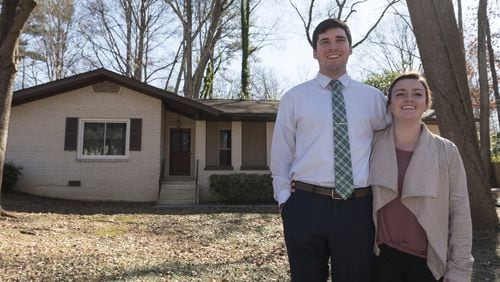Rising home prices don’t just change how much buyers pay. They can force them to settle for less, look elsewhere or even shelve their buying plans.
All three effects are being seen in metro Atlanta amid the strong rebound in prices of the past few years.
Ashley Brown, 26, went shopping for a house in Gwinnett County, where she grew up and had a job teaching at a middle school. She looked in Lawrenceville, Duluth, Suwanee and Buford.
“Anything I saw, it wasn’t in my price range and if it was, it didn’t really meet my standards,” she said. “There were places that were not horrible, but they didn’t call my name. It would have been like I was settling.”
She broadened her search and found a brand new townhouse in DeKalb for $139,000, offered by the same builder who was asking $200,000 in Lawrenceville.
“So you’d basically be paying to live in Gwinnett,” Brown concluded.
While the metro Atlanta market remains uneven and still in recovery mode in some areas, overall it is pretty healthy if you’re a seller.
For buyers, it looks a bit different since those increases have outpaced income growth for many metro Atlantans. Moreover, prices have risen faster at the lower end of the market. The result has been a relative trickle of first-time homebuyers into the market.
But if you get into a home, of course, you welcome the rising prices.
Short supply
Michael Fox, 26, and his wife bought a home last spring in Decatur. It took more than six months of searching – there just wasn’t a lot to look at, he said.
“If you want to be under four hundred grand and you are trying to find a house with two baths and good square footage and not in need of renovation, well, that is hard to find,” he said. “The inventory shortage is real.”
But in the past nine months, the value of their home has climbed about $40,000, he said. “So we are in a good position.”
The main force driving prices is the mismatch of supply and demand. In many parts of metro Atlanta, there is simply not enough inventory – that is, homes listed for sale. The result is intense competition among buyers, who sometimes end up bidding against each other, and a steady increase in sales prices.
Inventory at the end of December equated to roughly 4 months of sales – a little more than half of what is considered a balanced market, according to a recent report from Re/Max.
Of course, there are also parts of metro Atlanta that have not truly recovered from the housing bust, which hit the region harder than most.
In those neighborhoods, many homeowners are still “underwater,” owing more on their mortgages than their houses would fetch on the market.
“It does depend where you are looking,” said Craig McClelland, chief operating officer for Better Homes and Gardens Real Estate Metro Brokers.
The right direction
Overall, Atlanta’s housing market benefits from a healthy economy and solid job growth, McClelland said. “At the end of the day, Atlanta has everything heading in the right direction.”
It may even be healthier to have slow improvement than a housing boom, McClelland said.
“It’s not all bad: “We’ll end up with six years of steady growth instead of a two-year eruption.”
Yet the imbalance in the market continues to trouble experts. In most areas – especially in the lower-priced neighborhoods that might entice first-time buyers – there is stronger demand than supply.
Part of that is due to owners’ reluctance to put homes on the market. Some still owe too much on their mortgages, while others poured money into improvements and don’t think they can make their money back with a sale. Some feel hemmed in by a move-up market where prices look out of reach.
The heart of the issue is construction – or the lack of it, said Steve Brock, president of Brock Built Homes.
A decade ago, when the housing bubble neared its climax, the metro Atlanta market was dominated by small, locally-owned companies.
If the investment was uncertain, if there was a lag in demand, if mortgage rates were rising – none of that much mattered. They were going to build here or not at all, Brock said. Now, the vast majority of building here is done by regional or national companies that can build elsewhere if the profits are higher.
“The market is very different than it was,” Brock said.
A new equation
Moreover, the financial equation in Atlanta has changed, starting with the price of land, Brock said.
“The prices of land shot up and the cost of development overall went up dramatically,” he said. “The market for labor has also grown very, very tight. It is tough to build cheaply.”
That pushes prices up in general and gives builders an incentive to build higher-end homes, he said. “The builder has to make a profit to stay in business and all of his costs have gone up.”
Inventory will likely stay tight, and prices will rise as long as it does, said Josh Moffitt, president and founder of Silverton Mortgage.
But other factors make a buyer feel even more pinched: especially interest rates.
Mortgage rates remain historically low but are nudging up, he noted.
Low-end buyers are most sensitive to the increases, and they are the group the market needs most, Moffitt said.
“The first-time homebuyer is the engine that makes it all go. And we are still struggling with first-time homebuyers. They are delaying in the buying process.”
Or changing it, even for the buyer with a little bit of wiggle room on price.
Jackie Snyder quickly sold her Smyrna townhouse but faced rising rates as she went shopping for a new home.
She ended up buying a house less near downtown Marietta but boosted her down payment to 30 percent of the $459,900 price in order to hold down monthly payments.
Top of budget
“I love the house, but it was at the very top of my budget. I made the decision because I didn’t see anything else that I liked that was cheaper.”
Another crimp on inventory has come from investors, who have snapped up thousands of homes – often holding them for years to have the cash flow from rent.
Those purchases helped stabilize values in some neighborhoods that were in free fall, but as long as investors hold on to them, they are a constraint on inventory.
Sonia Carter, a Re/Max agent, said that many investors make improvements, but then are disappointed when they cannot quickly recoup their spending on a sale.
“It doesn’t really give back the value they think it has,” she said.
But investors are also active on the demand side, often making all-cash bids, she said.
That, too, puts other buyers at a disadvantage, Carter said.
“It’s just so competitive. We are competing with investors and cash buyers beat out loans every day.”
Average price increases, past year
Seattle, 10.4 percent
Portland, 10.1 percent
Denver, 8.7 percent.
Dallas, 8.1 percent
Tampa, 8.1 percent
Detroit, 6.6 percent
ATLANTA, 6.1 percent
Miami, 6.1 percent
Source: S&P/Case-Shiller House Price Index
About the Author







